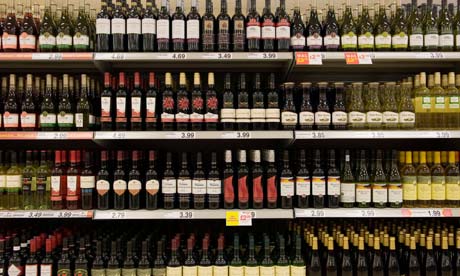
The NHS could save £1.7bn if it invested in treatment for the soaring numbers of people who are dependent on alcohol and endanger their own lives and those of others, according to a report.
There are 15,000 alcohol-related deaths every year and 1.2m incidents of violent crime precipitated by drinking. In spite of the numbers of people affected, alcohol treatment services are the poor relation of those available for the far smaller numbers of drug users, says Alcohol Concern.
"Messages on smoking, illegal drug misuse and obesity are now widely accepted and appropriate investment has been made – we have not yet reached this position with alcohol," says the report.
Alcohol-related admissions to hospital are rising fast, the figures show. More than 1m admissions a year are caused by excessive drinking, costing the NHS £2.7bn annually. The numbers have doubled since 2002. By the end of this parliament, says the group, admissions are set to rise to 1.5 million a year, costing the NHS £3.7bn. Putting an alcohol health worker in every hospital and GP practice, to give counselling and advice to anybody with alcohol-related problems, would save the NHS £3 for every £1 they cost, it says.
"Whereas successful action has been taken to reduce rates of smoking and illegal drugs, successive governments have failed to act decisively in treating the country's drink problem," said Don Schenker, chief executive of Alcohol Concern.
"With the prime minister saying that the NHS is becoming 'increasingly unaffordable', we can show how billions can be saved simply by introducing alcohol health workers in hospitals to help patients reduce their drinking.
"Government must make tackling alcohol misuse a priority for public health, leading to huge savings for the whole country. We need to encourage those who drink too much to realise it and get the help they need."
Alcohol is now the second biggest risk factor for cancer after smoking and is the biggest cause of liver disease, which is the fifth most common cause of death in England. Alcohol campaigners have been calling for the government to make alcohol a public health priority, saying that action taken on smoking and drug use has left alcohol services far behind. There are an estimated 1.6m dependent drinkers, but spending on treatment services is £217m a year, or £136 each, compared with the £436m spent helping the 332,000 dependent drug users, which amounts to £1,313 each – nearly 10 times as much.
"Alcohol dependence affects 4% of the population and problem drug use rates are closer to 0.5%, yet access to treatment is considerably better for drug misusers than for alcohol misusers," says the report.
The Department of Health said it was tackling alcohol misuse. "This report shows the devastating impact that alcohol has on the lives of people who drink too much," said a spokesman.
"The government has wasted no time in taking tough action to tackle problem drinking, including plans to stop supermarkets from selling alcohol below cost and working to introduce a tougher licensing regime. It is clear we need a bold new approach … because so many of the life-style driven health problems are already at alarming levels.''

